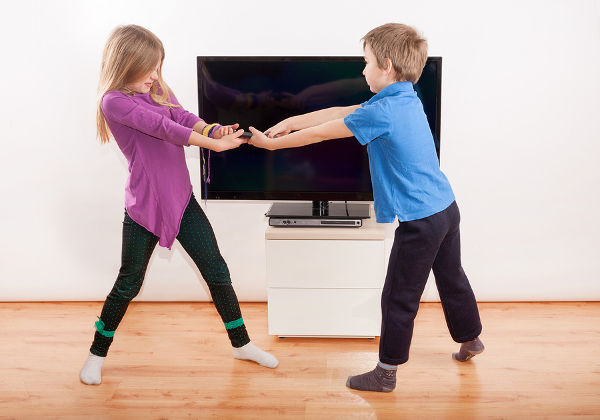You are woken up early in the morning by the stomp stomp stomp of your eldest child’s feet into your bedroom. He immediately demands the latest episode of Go Jetters on your bedroom television. You oblige because it’s 5.30am and the alternative is to listen to him whine about wanting to get up for the next hour. Plus, part of you still clings to the belief that if you are up at 5.30am it should be because you have spent the night partying and haven’t been to bed yet and not because your child is apparently immune to sleep. Two minutes in and there’s another stomp stomp stomp. Child number two has arrived and she wants Bing. There’s a lot of bickering, shouting, and tears whilst both sleep stealing monsters angels debate which cartoon should be on the television. Meanwhile, you wonder if age four really is too early for a TV in their bedroom.
Later, there’s an argument over who gets to play with a certain toy. Neither child is particularly fond of said toy, but because one child happened to pick it up in view of the other child, it has suddenly become the most valuable toy on the planet and nothing will convince either child otherwise. Throughout the day, further arguments arise. Who gets to sit on the chair by the door at the dining table. Who gets to have the blue plate and who gets to have the orange plate. Who gets to draw with the red pen and who gets to draw with the other red pen. And, yes, both pens are exactly the same but your child has been able to spot a small difference that is otherwise only visible on a molecular level and that difference is vitally important. It’s relentless and exhausting.
Why Do Siblings Fight?

Squabbles and bickering between siblings is entirely normal. Child are driven by impulse rather than logic, which is why battles about who gets what toy are common, even if it seems they are arguing over an item that neither would actually like to play with. They are also a way of your children getting your attention. Children quickly learn how to get a reaction from you and will start an argument with each other just as you are taking that important phone call or sitting down for a well deserved cup of tea just to make you take notice.
On the other hand, sibling squabbles can be an important part of a child’s development, as it’s through these seemingly pointless arguments that children can learn important skills, such as sharing, negotiation, and problem solving. That’s something to hold onto when you are separating your children for the fifteenth time before 10am.
How Can I Stop The Squabbles?

There’s no magic cure to completely stopping all arguments and, as noted above, these arguments do have some benefits. However, there are a number of tricks and techniques that we can use to promote harmony and to ensure that rifts don’t endure.
1. Don’t Get Involved
Remember a lot of the time the arguments are about getting your attention. Unless someone is about to get hurt, it’s best to let your children work it out themselves. Your children will quickly learn that it doesn’t get the required response from you and adjust their behaviour accordingly. It will also help them to develop their own problem solving techniques by allowing them to work out solution for themselves.
2. Praise Your Children
In those rare moments when your children do play nicely together then give them praise (or even a bribe) for doing so. For example, you could say something along the lines of: “Oh, that’s really lovely to see you two playing so nicely and being kind to each other! Well done!” This will help reinforce the positive behaviour.
3. Give Your Children A Place For Special Toys
Give your children a small basket or box where they can put their really special toys. Toys in these boxes cannot be played with by the other child. Keep it small, so there’s no chance of one child putting everything they own in there. Whilst sharing is an important skill, children do also need to feel in control of their surroundings and allowing them to put special toys aside helps them to do this.
4. Don’t Label Your Children
Applying names such as “the clever one” or “the sensible one” will not promote harmony between your children and will foster resentment. Avoid questions such as: “Why can’t you sit nicely like your sister?” Comparison is, after all, the thief of joy. Instead, point out positive behaviour without drawing attention to the other child’s failings, such as: “Look how nicely your sister is sitting. Show me how you can do the same.”
5. Diffuse Tension With Laughter
Whilst ignoring arguments can have a positive effect, sometimes you may want to get involved and diffuse the tension, for example, when you are constrained by time or feel that things are escalating too much. Try diffusing the situation with laughter. For example, if your children are arguing over a toy you could set a silly challenge to decide who keeps it, such as whoever can lick their elbow, or who can hop on one leg whilst balancing a bean bag on their head. Alternatively, you could join in the argument in an exaggerated and silly manner, i.e. “Oh, it’s soooooooo unfair! I wanted to play with Peppa Pig! I’m going to lie on the floor until I get a turn.”
6. Monitor Screen Time
Children are sponges, they absorb everything (even if they insist they “can’t remember” what happened at school one hour earlier). Be aware of what they are watching on TV and online. Just because something is marketed as child friendly doesn’t mean it is good for your child. Children may mimic what they see in cartoons, such as name-calling or even fighting moves.
7. Spend Quality Time With Each Child
Show your children that you value them equally by making time to have one to one time with each child. It doesn’t have to be long; it could just be five minutes each day. Put down mobile phones, get someone to watch other children if necessary, and let your child take the lead in what you do or talk about in that special time. If all children in the family unit are made to feel special, they are less likely to resent one another and bicker.




